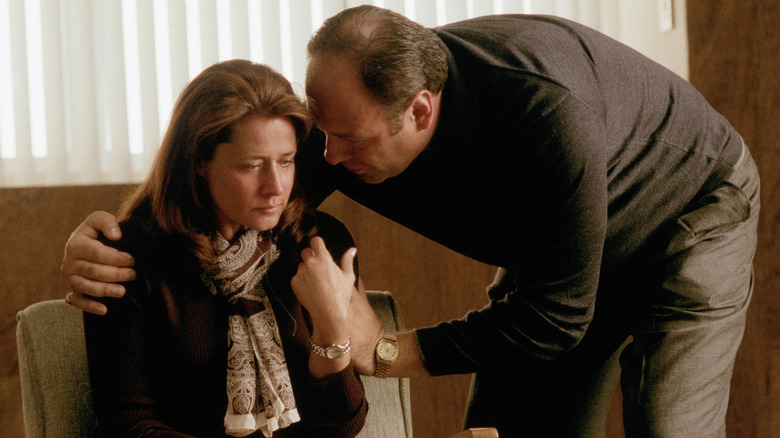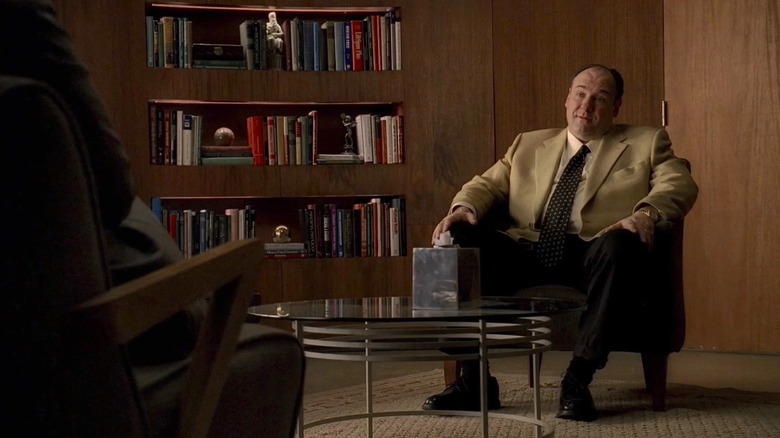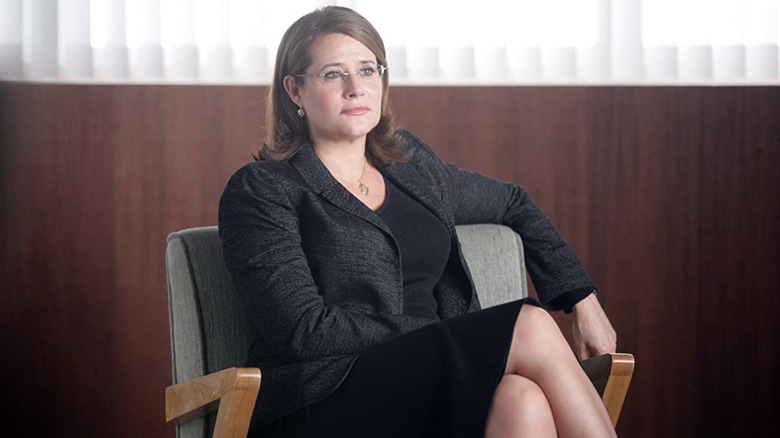James Gandolfini And Lorraine Bracco Fought A Secret War During The Sopranos' Therapy Scenes
Some of the most riveting scenes in "The Sopranos" have nothing to do with La Casa Nostra. Rather, it's the moments when Tony Soprano (James Gandolfini) is on the couch with his psychiatrist, Dr. Jennifer Melfi (Lorraine Bracco). It's usually a writing cheat to have your characters directly say their feelings aloud, but it worked in "The Sopranos" because of the therapeutic setting.
Since Melfi was Tony's therapist, she kept a distance from his personal life. Psychiatric practitioners have to do that, and it's an especially good idea when your patient is a crime boss. This meant that despite Bracco being part of the show's cast for its entire six season run, the vast majority of her scenes are with Gandolfini. Since the Tony's therapy scenes were a regular feature of the show, the cast and crew developed a go-to method for shooting them.
Bracco, like most of the "Sopranos" cast, appeared on the podcast "Talking Sopranos," hosted by Michael Imperioli (Christopher) and Steve Schirripa (Bobby). Her interview in episode 19, where she details the shooting method and her working relationship with Gandolfini, was also transcribed in Imperioli and Schirippa's book "Woke Up This Morning."
Who's telling the story?
On "Talking Sopranos," Imperioli asked Bracco if the therapy scenes were shot as a master shot with camera running on both her and Gandolfini, or if they shot one actor first then redid the scene with the camera on the other. Bracco confirms it was the latter, adding "We would always shoot [Gandolfini] first, because he was the storyteller."
This approach makes sense. The meat of the therapy scenes usually comes from Tony, and not just because he's the main character of the series. That's how the process works in real life too. In therapy, most of the weight falls on the patient. The doctor's role is to ask them questions which, hopefully, encourage self-reflection and reveal enough that the doctor can recommend a treatment. Melfi becomes a proxy for the viewer, watching Tony and learning as much about him as he's willing to reveal.
According to Bracco, Gandolfini also made great effort to immerse himself in Tony's mindset during these scenes. To limit distractions, the crew placed black screens behind Bracco so Gandolfini wouldn't see them or the camera while he was acting. He would also request that the camera be loaded with long rolls of film, so they wouldn't have to cut any takes in the middle of his performance.
As Bracco recounts, she sometimes became so mesmerized by his acting that she forgot she was his scene partner, not his audience:
"Once in a while I would catch myself not being Dr. Melfi, just being Lorraine Bracco watching this actor in awe... then all of a sudden, 'oh my god it's my part!'"
The prank war
Despite his dedication to his performance, Bracco also makes it clear that James Gandolfini was not an "all work no play" kind of guy. When it came time to shoot Melfi's half of the scene, the black screens would be put behind Gandolfini, meaning the crew now couldn't see him. He took advantage of this and mooned Bracco. Bracco didn't have much luck when she complained, recalling:
"They were going, 'Ugh, Lorraine, come on, let's go.' I am the one who always got in trouble. They got angry at me! Meanwhile, he's taking his pants off, showing me his tushy, which I would say, 'Stop that! Put that away! Put that away!'
So she decided to get revenge her own way. She revealed:
"One day I took Anabella Sciorra's hair extension, and I stuffed it in the front of my pantyhose and hid it. So when I crossed my legs, there was all this hair. Jim was totally grossed out. The look on his face was worth a million dollars. He goes, 'You're disgusting.' And my response was, 'I learned everything from you.'"
The sometimes adversarial relationship that Gandolfini and Bracco shared reflects their characters. Melfi grows conflicted between her disgust with Tony's criminal lifestyle and her attraction to him, while Tony's temper gets the better of him in more than one of their sessions. The actors having some tension offscreen made what they shared onscreen even more believable.


